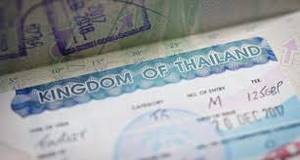Find out Thailand's new visa rules
New visa policies for tourists, students, and remote workers aim to attract more visitors and support economic recovery

Dubai: Thailand announces longer visa stays for tourists, postgraduate students, remote workers, and retirees. The decision is part of a broader effort to attract more international visitors to enhance the country's appeal as a prime destination for travelers and expatriates alike.
Starting in June, travelers from 93 countries will be permitted to stay in Thailand for periods of up to 60 days, an increase from the current 57 nations eligible for such durations. This change will make it easier for more tourists to visit Thailand without the need for frequent visa renewals.
Visa on arrival
More countries will now be eligible for visas on arrival, further simplifying entry procedures for international visitors. Government spokesperson Chai Wacharonke emphasized that these changes are designed to make Thailand a more attractive destination in a highly competitive global tourism market.
Students
For postgraduate students, the new visa regulations provide a significant advantage. Foreign students graduating from Thai institutions will be allowed to stay for an additional year, giving them more time to find employment or further their studies. This policy aims to retain talent within the country and support the local economy by encouraging skilled individuals to remain in Thailand.
Veterans
Retirees, another important demographic for Thailand's tourism sector, will benefit from relaxed insurance requirements. This change is expected to make Thailand a more appealing destination for retirees looking for a cost-effective and pleasant place to spend their later years.
Self-employed
One of the most notable changes is the extension of the validity of "digital nomad" visas for self-employed, remote workers. The validity of these visas will be five years, with each stay limited to 180 days. Previously, these visas were valid for only 60 days. This extension is aimed at attracting more remote workers who can contribute to the local economy without taking traditional jobs from the Thai workforce.
Strategic decision
Tourism is a key driver of Southeast Asia's second-largest economy and a major source of employment for millions of Thais. The new visa measures are part of a comprehensive strategy to increase the number of visitors from key and rapidly growing markets. By extending stay limits to 60 days for on-arrival visas, Thailand hopes to attract more long-term tourists and repeat visitors.
Results expected
The impact of these changes is expected to be substantial. From January to May 26 this year, Thailand recorded 14.3 million tourists. The country is targeting a record 40 million foreign arrivals for the entire year, with an anticipated revenue of 3.5 trillion baht ($95.73 billion). This ambitious goal aims to surpass the pre-pandemic record of 39.9 million arrivals in 2019, which generated 1.91 trillion baht.
Thailand's new visa policies are designed to boost its tourism sector and support economic recovery by making it easier for tourists, students, remote workers, and retirees to stay in the country. These measures reflect Thailand's commitment to remaining a top global destination and sustaining its vital tourism industry.